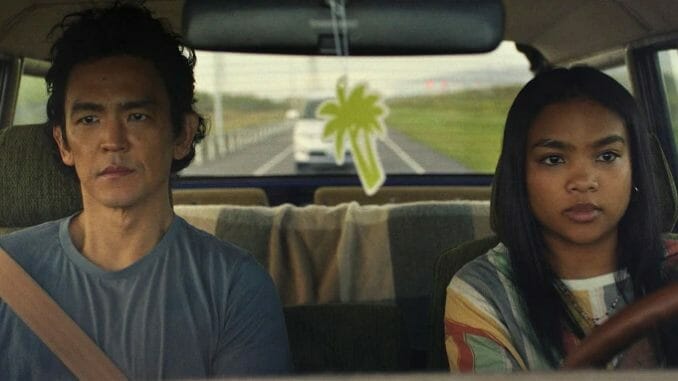Don’t Make Me Go‘s Dusty Screenwriting Is the Only Thing That’ll Make You Cry

Actress-turned-filmmaker Hannah Marks has an eye for accessible, heartfelt, relationship-based movies—stories about young people that strive for a depth of feeling beyond the Instagram-filter chintziness (or subplot-swollen bloat) of a Netflix-dominated youth-movies market. She’s written and/or directed romances both comic and dramatic, the best of which are Banana Split, which she co-wrote, and also co-stars as one half of a tight friendship that forms between a dude’s ex- and current girlfriends; and After Everything, which she wrote and directed, following a young romance challenged by a cancer diagnosis. I cite these movies as kind of an incantation against the shortcomings of Don’t Make Me Go, which Marks directed but didn’t write, and which has its heart in the right place, even as its head is located somewhere in a dusty screenwriting manual.
Like After Everything, Don’t Make Me Go focuses on how a cancer diagnosis can reorient a relationship, though in this case, the information is concealed from one party in an attempt to make the whole enterprise feel more like a movie. Max (John Cho) is a protective single father to his daughter Wally (Mia Isaac), so when he finds out about a tumor at the base of his skull that will be difficult to safely remove (his options are a year to live, or an extremely risky surgery), his thoughts immediately turn to Wally’s future care. Without telling Wally about his condition, he takes her on a road trip to his college reunion. His secret agenda: Track down Wally’s mother, who left the family when she was a baby, and establish a workable mother-daughter relationship.
Even in this minefield of hoariness—strategically concealed diagnoses; contrast between a buttoned-up, risk-averse parent and a more free-spirited child; metaphorical driving lessons powering an episodic road-trip structure for maximized lesson-learning—there are patches of real poignancy, provided principally by the actors. Though Cho is the right age to play the father of a teenager (and has done so before, in the thriller Searching), it’s still a shock to realize that he also played an uptight guy on a road-trip odyssey in Harold and Kumar Go to White Castle, which in turn brings home Max’s struggle with mortality. Isaac does nice work, too, capturing a cocktail of exasperation and affection that feels true to parent-child relationships. Marks obviously likes her characters, and her actors; she gives them plenty of space, the road-trip antics never pulling focus from Max and Wally.
-

-

-

-

-

-

-

-

-

-

-

-

-

-

-

-

-

-

-

-

-

-

-

-

-

-

-

-

-

-

-

-

-

-

-

-

-

-

-

-








































